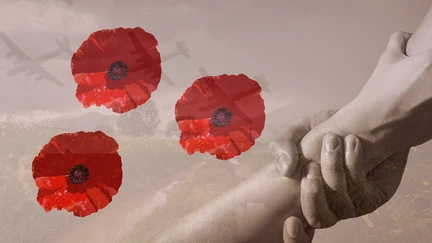He Hoiā, he Toa - Brave Soldiers
He hoiā, he toa — stories of Māori servicemen in the armed forces in the twentieth and twenty-first centuries.

Books to Read
Te Moananui-a-Kiwa Ngārimu
Moana-nui-a-Kiwa Ngārimu was the first Māori soldier to win the VC. A second lieutenant in the 28th (Maori) Battalion's C Company, he took part in the assault at Tebaga Gap, Tunisia, in March 1943.
"NZ Victoria Cross recipients" on NZHistory.net
Further Links:
- NZ On Screen: Ngārimu V.C
Television (Full length documentary) - 1993 - DNZB: Full biography of Te Moananui-a-Kiwa Ngārimu
- NZHistory: Photo of Te Moananui-a-Kiwa Ngārimu in 1940
- VC Citation in The London Gazette for Te Moananui-a-Kiwa Ngārimu
The London Gazette is one of the official journals of record or government gazettes of the Government of the United Kingdom.
William Barnard Rhodes-Moorhouse
William Barnard Rhodes-Moorhouse (Ngāti Tama, Ngāti Ruanui) has the distinction of being not just the first Māori airman, but also the first British airman to receive the award of Victoria Cross for his bravery in World War I.
Born in 1887 in Britain, Rhodes-Moorhouse and his siblings did not learn of their Māori ancestry, through his mother Mary Ann Rhodes, until 1908. Sadly, William Barnard died on 27 April 1915 after receiving horrific injuries during a successful bombing mission.
Read our full article about William Barnard Rhodes-Moorhouse, with sources, below (PDF), watch a documentary about Rhodes-Moorhouse, or find further links below.
Further links:
- NZHistory: William Rhodes Moorhouse biography
- Murder by Motor — New Brighton Residents Association
"Of the many personalities visiting New Brighton in its European history, this man would be one of the most remarkable and celebrated, yet he killed a boy on the beach just south of the old pier (opened 1894)"
Haane Te Rauawa Manahi
Another Maori Victoria Cross? The case of Haane Manahi. During the Battle of Takrouna in Tunisia in April 1943, Lance Sergeant Haane Manahi of Te Arawa led a small band of Māori soldiers up a 300-m-high rocky outcrop. Under mortar and machine-gun fire, they captured a stronghold held by more than 300 Italian and German troops. The act was described by Lieutenant General Sir Brian Horrocks as 'the most gallant feat of arms I witnessed in the course of the war'. While a field-marshal and three generals recommended Manahi for the Victoria Cross (VC), this recommendation was changed, and a Distinguished Conduct Medal (DCM) was awarded instead. It is not known who made this decision, or why.
"Haane Te Rauawa Manahi" on NZHistory.net
Further links:
John Pohe
Flying Officer Porokoru (John) Pohe was the first Māori pilot to arrive in England after passing through the Empire Air Training Scheme. He flew bombers over Germany until shot down. Pohe was executed on recapture after escaping with 76 other prisoners in the 'Great Escape' from the prisoner-of-war camp Stalag Luft III.
Monty Soutar, 'Ngā pakanga ki tāwāhi – Māori and overseas wars - Second World War: the Māori war effort', Te Ara - the Encyclopedia of New Zealand
Further links:
- Watch Turangaarere: The John Pohe Story (NZ On Screen)
- Porokoru Patapu "John" Pohe — extensive article on The Smithsonian Air and Space Museum website
Arapeta Awatere
Willie Apiata
Bill (Willie) Apiata VC is the first, and so far only, recipient of the Victoria Cross for New Zealand, which was instituted in 1999 to replace the British Victoria Cross. He earned the award for rescuing a wounded comrade under fire in Afghanistan in 2004.
NZHistory.net: Bill (Willie) Apiata VC
Further links:
- Watch Reluctant Hero (2008) - a full length television documentary on NZ On Screen
- Te Ara: Willie Apiata, VC (Photo)